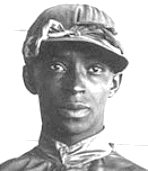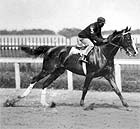 Open on Monday for the Martin Luther King, Jr., holiday, Aqueduct will run the Jimmy Winkfield, named for the last black jockey to win the Kentucky Derby. Formerly the Best Turn Stakes, the race was named in honor of Winkfield in 2005. On the NPR site, these photos are credited to Churchill Downs/ Kinetic.
Open on Monday for the Martin Luther King, Jr., holiday, Aqueduct will run the Jimmy Winkfield, named for the last black jockey to win the Kentucky Derby. Formerly the Best Turn Stakes, the race was named in honor of Winkfield in 2005. On the NPR site, these photos are credited to Churchill Downs/ Kinetic.
Jimmy Winkfield won the Kentucky Derby twice, in 1901 and 1902. Following that second victory, in the face of increasing economic and racial pressures, Winkfield left the United States for Russia. White jockeys in the United States were becoming increasingly resentful of the fame and fortune of black jockeys, who were among the highest-paid and best-known athletes of their time, and Winkfield decided to ply his trade abroad. He found tremendous success in Russia and lived as one of the elite; fearing that he would be a target as the Bolshevik Revolution began (NPR), he left for France, where he was once again successful, and where once again the political situation forced him to leave. Fleeing Nazi-occupied France for the United States, Winkfield worked here as a stablehand, as segregation and racism prevented him from maintaining the status he’d earned in Europe.
Following World War II, Winkfield returned to France, where he died in 1974.
According to Steve Crump, who made the documentary Forgotten at the Finish Line, about the roles of African-Americans in horse racing, thirteen of the fifteen jockeys in the first Kentucky Derby were black, as were fifteen of the first twenty-eight winners of the Derby. Since Winkfield’s win in 1902, only two black jockeys have ridden in the sport’s premier race (NPR).
In 2002, the centennial of Winkfield’s second Derby win, Winkfield’s daughter and granddaughter attended the Derby, and National Public Radio’s Weekend Edition Saturday did a story on them, in which Liliane Casey, Winkfield’s daughter, recalls her visit with her father to the 1961 Derby, in segregated Louisville; it’s a great piece to which you can listen for free. Edward Hotaling, one of Winkfield’s biographers, and Crump are both interviewed for it, as is Casey. The NPR page contains a link to a clip from Crump’s documentary, as well as a link to a Kentucky Derby web page on the history of African-Americans in the Derby. According to that page, four African-American owners since 1943 have raced horses in the Derby; one African-American has trained a Derby runner since 1951.
According to Crump, the early prominence of African-Americans in racing traces to slavery, when slaves took care of horses on plantations, giving them the knowledge and experience they needed to move into the racing business (NPR). In the twentieth century, social forces in the United States diminished and ultimately eliminated opportunities for blacks in racing, and it’s rare to see a dark face at many racing venues in the United States. A commenter on my recent post about Tampa Bay Downs wrote, “I walked through the grandstand looking for an African-American. He was very hard to find.” People of color are also hard to find at Saratoga, and that was true of Keeneland the one day I was there last spring. It’s not true at Belmont and Aqueduct, where the Caribbean crowd is significant, and it wasn’t true when I was at Gulfstream for ’07 Florida Derby, where Latinos made up a big portion of the crowd.
I haven’t yet read either of the two biographies recently published about Winkfield—they are on my (long) “to read” list. And I can’t really get any information about where to find Crump’s documentary, though he is, according to various websites, an accomplished and recognized film-maker. I’ve listed below the various sources I consulted, and about which I learned, as I was writing this, along with information about the Winkfield bios.
Racing doesn’t need another item to its long list of problems to solve, and it seems that in some ways, it faces a similar problem to baseball: African-American participation is declining (or virtually non-existent in racing), while Latino participation is thriving, at least in the saddle. I appreciate that NYRA chose to name a race after Jimmy Winkfield; race aside, he’s one of only four jockeys to win the Kentucky Derby in consecutive years (the other three are Isaac Murphy, Ron Turcotte and Eddie Delahoussaye) and his accomplishments, which were probably less than remarkable at the time, became all the more noteworthy because no people of color have followed in his footsteps. We remember Winkfield now because succeeding generations prohibited other jockeys of color from achieving what he did. In 2008, there’s something distasteful, even shameful, about the prevalence of people of color on the backside, taking care of the horses, eking out a living, doing the jobs at the bottom of the racing ladder, while there are virtually no people of color in the grandstands, the clubhouse, or the winner’s circle.
Biographies of Jimmy Winkfield:
Wink: The Incredible Life and Epic Journey of Jimmy Winkfield, by Ed Hotaling, published in 2004 by McGraw-Hill.
Black Maestro: The Epic Life of an American Legend, by Joe Drape, published in 2006 by HarperCollins.
Forgotten at the Finish Line, directed by Steve Crump.
Sources consulted:
“African Americans in the Derby.” Kentucky Derby 128. 2002. 20 Jan 2008.
“Derby History: Jockeys.” Kentucky Derby 134. 20 Jan 2008.
Donovan, Eric. “Winkfield was a World Traveler.” New York Racing Association. 20 Jan 2008.
“Jimmy Winkfield, a horse racing legend!” The African American Registry. 20 January 2008.
“Jimmy Winkfield.” National Museum of Racing. 20 Jan 2008.
“The Remarkable Ride of Jimmy Winkfield.” Weekend Edition Saturday. By Howard Berkes. Natl. Public Radio. 4 May 2002. 20 Jan 2008.

Wink was awesome, he lived through history and was part of it, really incredible book,
Well done!
Excellant post. I find the stories of both Wink and Isaac Murphy to be so tragic to the history of racing in the fact that they are relatively forgotten yet they were two of the greatest jockeys to grace the sport. It reminds me of growing up in Memphis. There were several African-American grooms to a top Saddlebred trainer that knew so much about horses that their knowledge just would leave me awestruck. They later moved on to other breeds but it wouldn’t have mattered the breed, they knew HORSES. They knew the horses demeanor, the way it walked, how it ate, what was going on with the horse, they knew it inside and out. They took the time to know that animal, to understand, and to relate. Today they would have been considered “whisperers.” I honestly believe they should have been trainers and would have made darn fine good ones! It just illustrates how much the horse industry as a whole has lost due to the decline of participation of African-American community.
Very interesting post! Have you checked out the book ‘The Great Black Jockeys’ by Edward Hotaling? I got it in the mail a couple of months ago, but haven’t gotten a chance to read it yet [so many books … so little time].
Thanks, everyone, for the reading tips and the comments…as if my book pile weren’t already high enough! But now the two Hotaling books are on it. Trip: Excellent observations. We can’t begin to calculate how African-Americans might have contributed to racing if they’d been allowed to.And I didn’t know that you were from Memphis! I thought you were born and bred Kentuckian…